Elefante blanco
- 2012
- Tous publics
- 1h 45min
NOTE IMDb
6,5/10
5,6 k
MA NOTE
Alors qu'il travaille aux côtés de son ami et collègue de longue date à construire un hôpital pour les habitants d'un bidonville de Buenos Aires, un prêtre perturbé trouve réconfort auprès d... Tout lireAlors qu'il travaille aux côtés de son ami et collègue de longue date à construire un hôpital pour les habitants d'un bidonville de Buenos Aires, un prêtre perturbé trouve réconfort auprès d'une jeune assistante sociale athée.Alors qu'il travaille aux côtés de son ami et collègue de longue date à construire un hôpital pour les habitants d'un bidonville de Buenos Aires, un prêtre perturbé trouve réconfort auprès d'une jeune assistante sociale athée.
- Récompenses
- 1 victoire et 9 nominations au total
Jérémie Renier
- Nicolás
- (as Jeremie Renier)
Martina Gusmán
- Luciana
- (as Martina Gusman)
Federico Barga
- Monito
- (as Federico Benjamín Barga)
Walter Jakob
- Lisandro
- (as Walter Alfredo Jakob)
Mauricio Minetti
- Cruz
- (as Mauricio Sergio Minetti)
Tatiana Giménez
- Tati
- (as Tatiana Gimenez)
José Gómez
- Domingo
- (as Jose 'Negro' Gomez)
Histoire
Le saviez-vous
- AnecdotesPriest Julian's dedication to the Villa residents bears a striking resemblance to real life Priest of the Villa, Carlos Mugica. Although born into a well off middle class family, Mugica emphasized with the poor in Argentina particularly in Buenos Aires. He preached liberation theology to Villa residents and is hailed as a Third World priest similar to Oscar Romero from El Salvador. Mugica also supported both spiritually and unapologetically the liberation struggles of the poor and revolution students. His political alignment to left wing radical politics (revolutionary) in the 1960s and continued work among the villa's habitants, accumulated in his assassination in 1975.
- ConnexionsFeatured in Televisión registrada: Ricardo Darín (2012)
- Bandes originalesA Satire Against Reason
Written by Michael Nyman
Performed by The Michael Nyman Band
Published by Chester Music Limited
Courtesy of MN Records Limited
Commentaire à la une
Argentinean director Pablo Trapero brings to the screen a very dark seemingly hopeless disparity between the rich and the poor. Written by Trapero along with Alejandro Fadel, Martín Mauregui and Santiago Mitre, the story will burn on the viewer's mind the hypocrisy of disparity between the rich and the poor.
The film opens in the Peruvian jungle where Father Nicolás (Jérémie Renier) witnesses the brutal massacre of his friends and congregation while he alone survives, leaving a profound sense of guilt for not having also died in the catastrophe. Father Nicolás's beloved friend and confessor Father Julián (Ricardo Darín) brings Nicolás to the "Villa Virgin", a 'favela' like shantytown in the slums of Buenos Aires near an abandoned huge project for a hospital that was started decades ago in Buenos Aires, seen today as a typical "white elephant", a useless structure that now houses the poverty stricken inhabitants. Drugs provide the major business in this ghetto. Assault weapons and firearms can be found almost everywhere. Add all that to the precarious living conditions and this sort of hell on earth is not even fit for anyone to endure. The two priests work tirelessly to help the local people. Julián uses his political connections to oversee the construction of a hospital. Nicolás remains deeply troubled from his experience in the jungle, but he does find comfort in Luciana (Martina Gusman), a young, attractive, atheist social worker. As Nicolás' faith weakens, tension and violence between the slum drug dealing cartels grows. And when work on the hospital is halted by ministerial decree, the faith of the inhabitants of Villa Virgin is shattered, and Nicolás discovers he has been called by Julián to assume his role of parish priest as Julián is coping with an undiagnosed neurological disease. It is a test of wills, a test of faith, and a sense of being crushed by the politics of Argentina.
Because of the setting in the filthy and decrepit slum the visuals become confusing with the cinematography by Guillermo Nieto attempting to take in too much visual information to the point of confusing the story line. But the musical score by Michael Nyman is brilliant and enhances the film tremendously. The three major actors - Darin, Renier, and Gusman - are outstanding in very difficult roles. If the audience is left with a sense of the futility the people of the slums face daily, then the film has accomplished its mission. In Spanish with English subtitles.
Grady Harp
The film opens in the Peruvian jungle where Father Nicolás (Jérémie Renier) witnesses the brutal massacre of his friends and congregation while he alone survives, leaving a profound sense of guilt for not having also died in the catastrophe. Father Nicolás's beloved friend and confessor Father Julián (Ricardo Darín) brings Nicolás to the "Villa Virgin", a 'favela' like shantytown in the slums of Buenos Aires near an abandoned huge project for a hospital that was started decades ago in Buenos Aires, seen today as a typical "white elephant", a useless structure that now houses the poverty stricken inhabitants. Drugs provide the major business in this ghetto. Assault weapons and firearms can be found almost everywhere. Add all that to the precarious living conditions and this sort of hell on earth is not even fit for anyone to endure. The two priests work tirelessly to help the local people. Julián uses his political connections to oversee the construction of a hospital. Nicolás remains deeply troubled from his experience in the jungle, but he does find comfort in Luciana (Martina Gusman), a young, attractive, atheist social worker. As Nicolás' faith weakens, tension and violence between the slum drug dealing cartels grows. And when work on the hospital is halted by ministerial decree, the faith of the inhabitants of Villa Virgin is shattered, and Nicolás discovers he has been called by Julián to assume his role of parish priest as Julián is coping with an undiagnosed neurological disease. It is a test of wills, a test of faith, and a sense of being crushed by the politics of Argentina.
Because of the setting in the filthy and decrepit slum the visuals become confusing with the cinematography by Guillermo Nieto attempting to take in too much visual information to the point of confusing the story line. But the musical score by Michael Nyman is brilliant and enhances the film tremendously. The three major actors - Darin, Renier, and Gusman - are outstanding in very difficult roles. If the audience is left with a sense of the futility the people of the slums face daily, then the film has accomplished its mission. In Spanish with English subtitles.
Grady Harp
Meilleurs choix
Connectez-vous pour évaluer et suivre la liste de favoris afin de recevoir des recommandations personnalisées
- How long is White Elephant?Alimenté par Alexa
Détails
- Date de sortie
- Pays d’origine
- Site officiel
- Langues
- Aussi connu sous le nom de
- White Elephant
- Lieux de tournage
- Avenida Piedra Buena, Villa Lugano, Buenos Aires, District fédéral, Argentine(Elefante Blanco and slum)
- Sociétés de production
- Voir plus de crédits d'entreprise sur IMDbPro
Box-office
- Montant brut aux États-Unis et au Canada
- 8 884 $US
- Week-end de sortie aux États-Unis et au Canada
- 5 098 $US
- 31 mars 2013
- Montant brut mondial
- 4 387 907 $US
- Durée1 heure 45 minutes
- Couleur
- Mixage
- Rapport de forme
- 2.35 : 1
Contribuer à cette page
Suggérer une modification ou ajouter du contenu manquant

Lacune principale
By what name was Elefante blanco (2012) officially released in Canada in English?
Répondre























